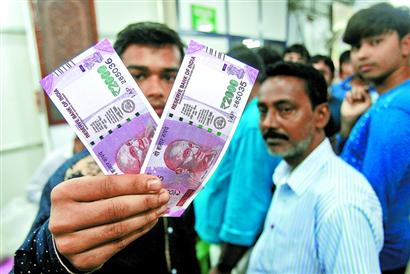Finance and economics: Money in India: Taking notes
财经:印度的货币:兑换钞票
The government transforms base money into nothingness (and gold) .
政府把基础货币变得一文不值(以及金本位)。
Not much distinguishes a valuable banknote from any old piece of printed paper, as Indians discovered this week.
本周,印度民众发现有价值的纸钞和旧版的打印纸没有太大差别。

In a surprise televised address on November 8th, Narendra Modi, the prime minister, announced that the country’s two highest-denomination notes, worth 500 and 1,000 rupees ($7.50 and $15) , were to be legally worthless with near-immediate effect.
在11月8日,印度总理纳伦德拉-莫迪在一场令人震惊的电视讲话中宣布,本国两种最高面值的纸币,即500和1000卢比(约7.5美元和15美元)将在近期被正式废除使用。
This odd variant of alchemy is the latest in a series of moves to curb illicit income; economists hope long-term gains will justify a chaotic spell as India adapts.
这种让人摸不着头脑的纸币转变政策是打击不正当收入的一系列行动第一步。经济学家希望长远好处会让印度所经历的混乱政策变得有意义。
The idea is not as barmy as it might first appear.
这个想法可能并没有乍看之下那么疯狂。
Mr Modi has implemented a flurry of schemes to flush out “black money”, the term Indians use for cash which is both unaccounted for and outside its formal financial system.
莫迪先生实施了一系列计划来打击“黑钱”,这个词被印第安人用来描述除现金以外下落不明或游离在其正规金融系统之外的非法现金。
Piles of ill-gotten income have long been easy to launder into gold or property, where using notes for at least part of a purchase is the norm.
成堆的非法收入现金长期以来可以轻易洗白成黄金或者地产,因为这些在交易过程中一般至少使用部分纸钞。
“Demonetising” high-value tender means existing notes must be traded in at banks and post offices before the end of the year.
废除大额货币流通意味着在今年年底之前,现存的纸币必须在银行或者邮局被换掉。
That will force those with suitcases of cash either to come clean or to renounce their loot.
这将迫使那些拥有成箱现金的人要么证明自己的钱是干净的,要么放弃他们的非法收入。
Still, it is dramatic: central banks usually balk at moves that call into question the legal worth of the notes they issue.
不过,这是戏剧性的:中央银行通常在对他们发行的票据的法律价值引起质疑的政策上犹豫不决。
The hastily discontinued tender represents 86% of all the currency in circulation (equivalent to 11% of GDP) in a country where cash remains king.
这些仓促地中断货币流通行为包括了在现金仍然占主导地位的国家中的86%的流通中的货币(相当于GDP的11%)。
Many Indian residents found themselves with little still-legal cash on hand ahead of a forcibly imposed bank holiday and a two-day shutdown of ATMs.
因为面对银行强制休假和自动取款机关闭的两天,许多印度居民发现自己手里几乎没有合法的现金。
A senior bank executive in Mumbai admitted to raiding his daughter’s piggy bank to pay for tolls on his way to work.
在孟买,银行高管说他打破他女儿的存钱罐支付上班路上的通行费。
The prospect of life with little or no cash, at least for a few days, cheered those who think Indians should be switching to smartphone apps and card-based payments, which are easier for the authorities to track and tax.
只有少量现金或者没有现金的生活景象(至少那几天是)鼓舞了那些认为印度应该使用手机应用和银行卡付款的人,他们觉得手机应用 银行卡付款方便当局追踪和收税。
That laudable aim will take time in a country where nine out of every ten workers still toil in the informal sector.
这个值得称赞的目标在绝大数工人仍然工作在非正规部门的国家的实现需要时间。
Though the number of Indians with bank accounts has risen sharply thanks to a government financial-inclusion scheme, most savings are still held outside the banking system.
尽管印第安人与银行账户的数量急剧上升得益于政府的金融包容计划,大多数储蓄仍在银行体系之外。
One-fifth of total economic output is said to be informal.
五分之一的总经济产出据称是非正式的。
Banks are among those who should gain from the scheme: much cash now secreted under mattresses should make its way into their coffers or into the mutual funds they offer.
银行是这项计划的获益者之一:大量藏匿于床下的现金应该会进入他们的金库或者是他们提供的共同基金。












